New Year’s resolutions are everywhere this time of year—and so is the hate for them. Scroll through social media, and you’ll see people declaring them useless, doomed from the start.
And I get it. The data shows that the success rate on achieving New Year’s resolutions is terrible! I mean – really, really bad.
- approximately 80% of people have abandoned their resolutions by mid-February (link)
- only about 9% of people feel they successfully achieved their resolutions by year end (link)
- nearly a quarter (23%) give up within the first week (link)
Looking at the data, it’s tempting to think resolutions are pointless. But resolutions themselves aren’t the issue; it’s how we approach them. People don’t have the same hate on for the idea of setting “goals”, and New Year’s resolutions are just goals that are set at the start of a new year. The issue is with how people approach them; let’s explore the challenges.
Why Most People Fail in their New Year’s Resolutions
Most people fail to stick to their resolutions for a few key reasons:
- They Overcommit. Trying to overall everything at once is a recipe for disaster. Add to that the unrealistic expectations, like going from zero exercise to working out 90 minutes daily, and it’s no wonder so many give up. Major lifestyle changes don’t happen overnight.
- They Want the Outcome, Not the Process. This is one of the biggest culprits. People want the beach body, but they don’t want the workouts or the clean eating that come with it. They want to publish a book but aren’t ready to sit down and write every day. Without embracing the process, the goal is nothing more than a dream.
- Their Goals Don’t Align With Their Values. Most people don’t even know what their values are, never mind how their goals align to those values. Without a meaningful “why” behind the goal, the motivation quickly fades, leaving people right where they started. That’s why gym owners see the same pattern every January—packed facilities on the 2nd, ghost towns by the 20th.
- They “Set It and Forget It.” Resolutions aren’t like slow cookers—you can’t just set them and expect results to appear on their own. Setting the goal is just the first step. Achieving it requires consistent action, reflection, and adjustment. If you set it in January, forget about it until June, and then wonder why you didn’t succeed — the problem isn’t the resolution, it’s your process. Worse, this pattern creates a damaging narrative: that you’re incapable of achieving goals or that setting them is pointless. Don’t do that!
Why Goals (or Resolutions) Matter
Without goals, you don’t know how to act. Goals clarify what systems, habits, and routines you need to develop. They focus your energy and attention, pointing you toward progress.
And moments like the turn of the year are powerful opportunities to reset. Psychologists call these “temporal landmarks”—moments in time that allow us to pause, evaluate, and decide what’s next.
In fact, a study published in Harvard Business Review (link) found that people who regularly reflect on their work perform significantly better than those who don’t. Reflection helps us identify patterns, see what’s working (and what isn’t), and make deliberate adjustments.
Without goals, you’re aimlessly wandering through your life with no map, no compass, and no clear destination. So stop hating on them, and approach them more sensibly.
How to Set Resolutions That Work
Reflection is step one, but it’s not the whole process. The key to successful goal-setting lies in the following five steps:
- Reflect on the past. Look at what worked, what didn’t, and why.
- Set a vision for the future. Dream big, but stay rooted in your values and priorities.
- Plan the specific actions you’ll take. Break your goal into actionable, manageable steps.
- Act and measure progress. Consistency is king. Take small, deliberate steps daily, and track your progress.
- Adjust as needed. Use the data you gather along the way to refine your approach.
Most people only do steps 2 and 3, skipping the rest—and then wonder why they fail. If you’re only setting resolutions without following through, you’re right: New Year’s resolutions are useless.
But done the right way? They can be the foundation for real, lasting change.
Your Call to Action
This year, don’t give up on resolutions. Instead, give up on bad goal-setting habits. Take the time to reflect, plan, and act with purpose.
Ready to get started?
Commit to the process, and make your resolutions not just a possibility, but a certainty.
Quotation that I’ve been pondering
Sometimes, the best way forward is realizing you’re headed in the wrong direction and choosing to course-correct. As C.S. Lewis reminds us, true progress isn’t about speed, but about moving toward what’s you’re after.
“We all want progress, but if you’re on the wrong road, progress means doing an about-turn and walking back to the right road; in that case, the man who turns back soonest is the most progressive.”
Journal prompt
Sometimes (often!) you’re getting in your own way of achieving your goals. You’ve got a habit or belief that moves you farther from the goal. What’s one thing you’re holding onto that might be keeping you from achieving your goals? How would your path forward change if you let it go?
Call to Adventure
Don’t let 2025 become yet one more year of wishing things were different. It’s time to get serious, take action, and bring in the accountability you need to make real change happen.
If you’re ready to make a change, I’m ready to help you make 2025 your breakout year.
Book 1-on-1 career conversation
Until next week!!
Work and live well.
Tim
Did someone awesome forward you this email? Sign up here to ensure you get my latest content.
Do you know someone who would benefit from this content? Please pass it along! ♻️



